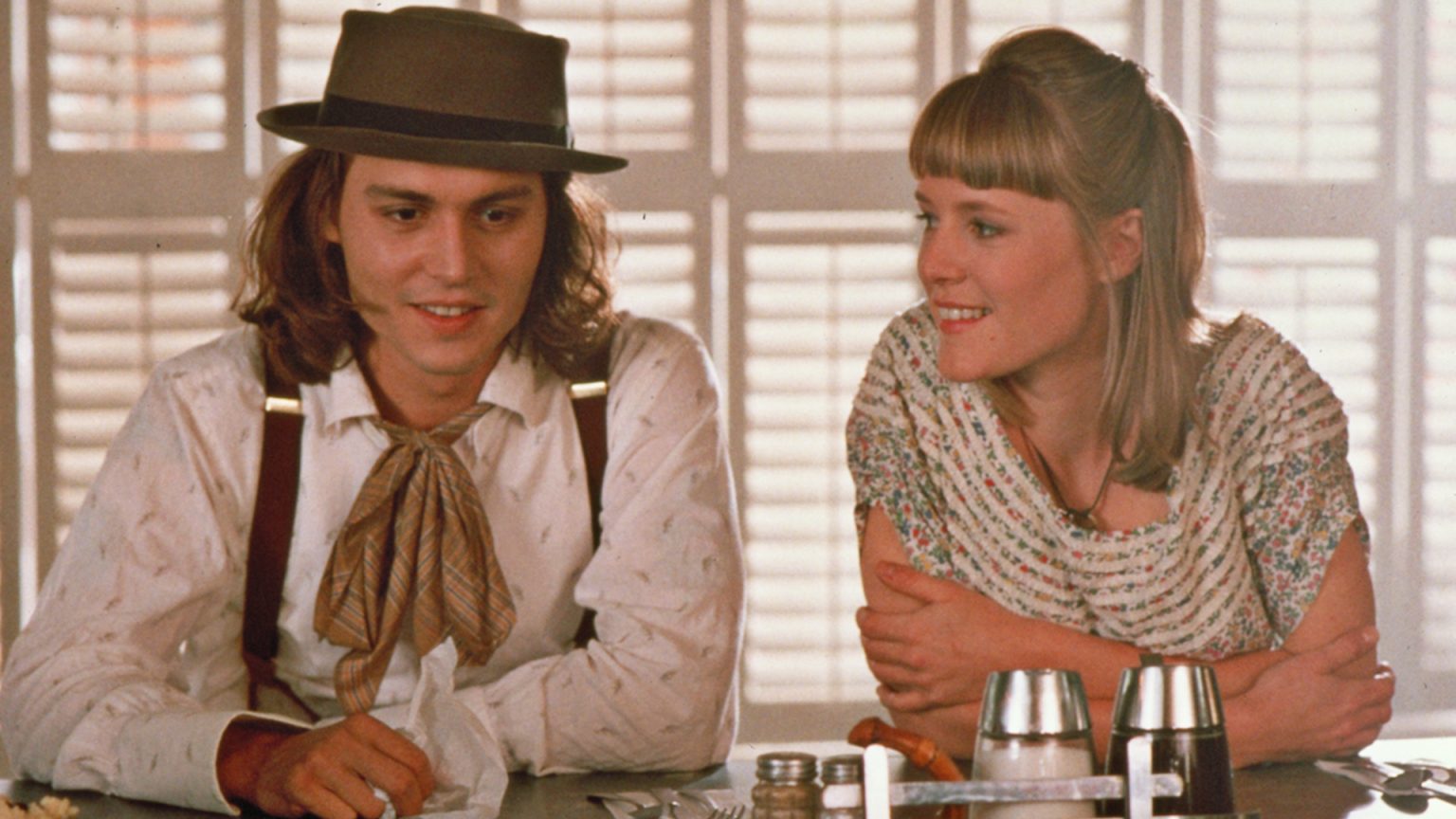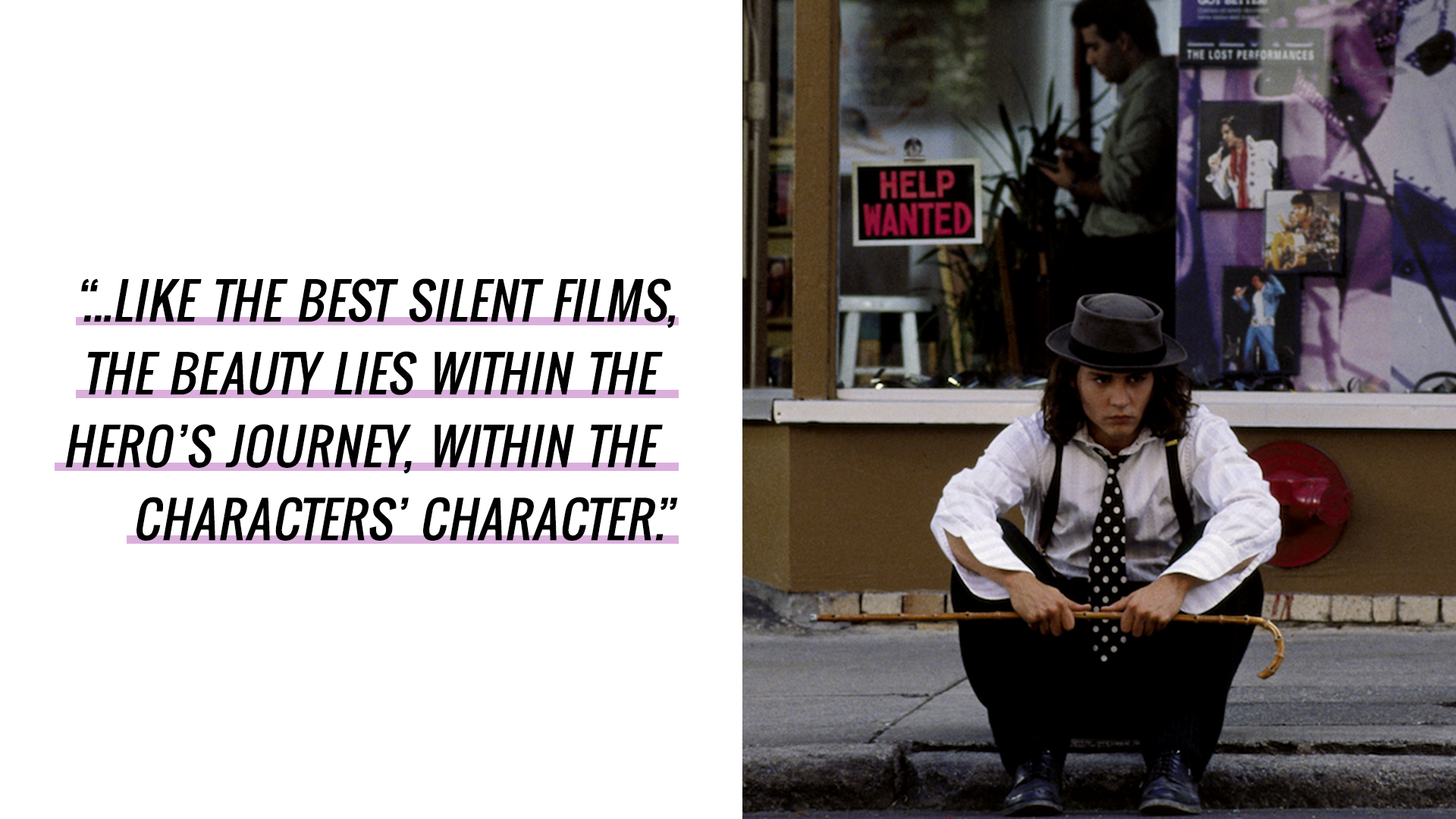In the 1993 romantic comedy Benny & Joon, three underdogs experience life-changing epiphanies through misunderstandings and compromise. Beneath their eccentric appearances and behavior, though, is something genuine and pure: a search for happiness and lasting connections. Twenty-five years after its release, Benny & Joon remains an undervalued film about underdogs and outliers that utterly confuse rational-thinking individuals.
Aided by The Proclaimer’s 90s classic “I’m Gonna Be (500 Miles),” the film opens with Joon (Mary Stuart Masterson) painting in her domestic setting. Director Jeremiah S. Chechik juxtaposes her artistry with the introduction of Sam (Johnny Depp). He’s a freewheelin’ vagabond, gazing out at the horizon aboard a Spokane-bound train with his face partially obscured by Robert Benayoun’s The Look of Buster Keaton—a hint at the silent-era inspired physicality that informs Depp’s character. Through its definitively 90s opening sequence, Benny & Joon raises questions about first impressions and the subjectivity of art.
In a key early scene, Joon loses a bet with her brother Benny’s (Aidan Quinn) friend, Mike, and as part of the stakes must board Sam, his cousin, a twenty-six-year-old that “can’t read” and watches “strange movies.” And though this assessment seems harsh, the main characters rarely appear mean-spirited in response. As Benny, Quinn represents the film’s calming force. For a modern cinematic comparison, The Fighter’s Mickey Ward (Mark Wahlberg) comes to mind; a blue-collar underdog that lives on the fringe, mostly subservient to the more animated personalities around him—at least until the moment of truth. As Joon, Masterson delivers a painfully real performance as her character reflects on her parents’ sudden deaths while attempting to claim her individuality as an adult. As for Depp, he manages to convey Sam’s warmth and understanding through simple gestures and non-confrontational behavior. His character feels like a 90s equivalency of Saoirse Ronan’s Christine McPherson in the 2017 Oscar-nominated film, Lady Bird. He’s a brilliant performer—one that makes complete strangers cry from laughter—but he knows when to pull the curtain down. The central figures are genuine, linked together by fate, and it’s the heartwarming performances that make each character especially relatable.
Benny & Joon hints that Masterson’s character is schizophrenic. To be entirely reductive, the film examines whether she, and people with similar personalities, can live independent, happy lives. After losing her parents and living only with her brother for twelve years into adulthood, it’s entirely possible that Joon is deeply depressed and simply hasn’t developed the appropriate social skills that others deem “normal.” When she lashes out, it’s usually because she feels judged. But around those she trusts, Joon appears charismatic with a sharp (and self-aware) sense of humor. At times, she’s clearly testing Benny to elicit an emotional response. In such moments, Benny & Joon blurs the lines between mental illness and simple gags designed for a laugh.
Unsurprisingly, Benny & Joon has been accused of trivializing mental illness, but it’s significant that Joon’s disorder is never clarified on screen. In 1993, the film’s New York Times review described it as “a dangerously fanciful story of cute eccentrics,” while another a New York Times piece refers to Joon as “a diagnosed schizophrenic.” Although the first assessment has merit, the second is factually incorrect. For viewers, Joon’s condition is a matter of interpretation. As Joon herself communicates to Benny, “You need me to be sick.” Sam knows this basic truth about Joon, and Joon knows an important truth about Sam: He’s not illiterate, as his cousin suggests, he just needs some help. In private, Joon and Sam find the words that often elude them in public settings. During a brief conversation about consumerism, it’s telling that Joon labels the California Raisins (early 90s!) as “sick.” Both characters are scared by the popular, surrealist creations, designed to be devoured by human beings. It’s a wonderful pop culture reference that gently pokes fun at skeptical, hypocritical individuals while suggesting that Sam and Joon are perfectly normal, albeit with some issues like everybody else.
Throughout the movie, director Chechik and his cinematographer John Schwartzman stay balanced yet effective with their filmmaking via exterior, investigative POV shots and long takes to underline emotion. Compared to other films of the era, Benny & Joon isn’t fantastical like Tim Burton’s Edward Scissorhands (1990), overtly clever like Richard Linklater’s Slacker (1990), or cinematically inventive like Quentin Tarantino’s Reservoir Dogs (1992). But like the best silent films, the beauty lies within the hero’s journey, within the characters’ character.
A quarter-century after its release, Benny & Joon reminds that we all have our quirks, but that doesn’t mean we should be embarrassed by them. Life is about embracing all those oddities and peculiarities that make one unique. Some people consume pizza but not the crust, while others, like Benny and Joon, choose to prepare grilled-cheese sandwiches with an iron. As the world becomes smaller and innovative dreamers help shape society, hopefully characters like Benny and Joon will resonate with a new generation of underdogs.
Watch Benny & Joon on Fandor: Here. Want more? Check out the rest of our Spotlight: Underdogs.





